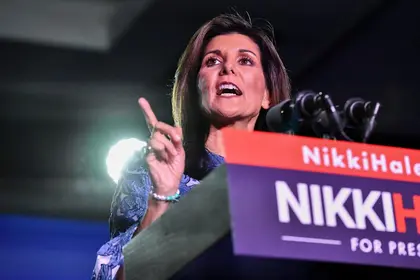The New Hampshire Primary results on Jan. 23 surprised no one. Former President Donald Trump garnered a majority of 54.5 percent of the vote, while his Republican opponent, former Ambassador Nikki Haley earned a 43.2 percent. While Haley lost by 11.3 percent, her second place finish could be interpreted as a harbinger of good political things to come.
Woven into the fabric of America’s two-party political system is the notion that incumbents always have an enormous advantage in re-election competitions, and while Trump is not currently an office-holder, he’s also no ordinary challenger to President Joe Biden.
JOIN US ON TELEGRAM
Follow our coverage of the war on the @Kyivpost_official.
Despite beating second-place Haley by double digits, was Donald Trump, the GOP party leader and likely presidential nominee, really New Hampshire’s biggest winner? Not if you were to ask Nikki Haley’s backers.
Trump’s Make America Great Again (MAGA) movement is a juggernaut that has propelled him with seemingly limitless fundraising potential and a core of support that proved non-fungible to similar, more traditional candidates who sought to imitate the Trump model, such as Florida Governor Ron Desantis, who once declared that he was Trump without the baggage.
Polling ahead of the previous Iowa caucus conducted by NBC News/Des Moines Register/Mediacaom, published in Politico, revealed that “fully 43 percent of Nikki Haley supporters said they would back President Joe Biden over Trump.”

Russian Intelligence Chief Declares Moscow Close to Achieving Military Goals
Nikki Haley sizes up her opponent as someone who is unelectable in the next presidential elections, who may be only able to garner the support of about half of his own party, a narrative that she will continue to push as she seeks to hang on through at least the Feb. 24 primary in South Carolina, her home state.
Haley backers may also argue that neither Iowa nor New Hampshire reflects the diversity of the electorate in the US and so may not be the best canaries to indicate what will fly with mainstream American voters. Recognizing the lack of diversity, the Democratic National Committee (DNC) decided to snub New Hampshire in favor of launching Biden’s campaign in a more demographically significant state like South Carolina, where Black voters are a sizable portion of the electorate and a critically important Democratic voting bloc.
For Biden, during his 2020 race, South Carolina proved to be a key turning point when he obtained the endorsement of Congressman Jim Clyburn. Trump, on the other hand, sees South Carolina as his best opportunity to consolidate Republican voters who may be enticed by a familiar face.
And while South Carolina is Nikki Haley’s home turf, the state overall is firmly in support of the former president, as is much of the Southern part of the country. Indeed, Haley failed to get the endorsements of either the current South Carolina Governor Henry McMaster or US Senator Tim Scott, and current polling shows she lags 30 points behind Trump in the state.
Undeterred, Haley has planned a $4 million ad blitz that could erode some of Trump’s support if he continues to make embarrassing gaffes in public appearances, such as confusing Haley with Nancy Pelosi, which led Haley to effectively attacking Trump’s mental fitness.
Nikki Haley sizes up her opponent as someone who is unelectable in the next presidential elections
Haley is banking on her anti-establishment campaign to survive through to Super Tuesday primaries on March 5, when the demographics are overall much more advantageous and as much as a third of the available delegates in 16 states are up for grabs.
However, there is another side to Haley’s desire to press forward: Trump is not only balancing multiple federal and state criminal indictments, and with enormous civil liabilities racking-up, but now faces potential disqualification from the ballot in Colorado and Maine, as government officials there have claimed that allowing Trump’s candidacy would be tantamount to disregarding the American Constitution.
According to Reuters, the Colorado ruling is based on Section 3 of the 14th Amendment which “bars from holding office any ‘officer of the United States’ who has ‘engaged in insurrection or rebellion against the same.’” Trump’s team intends to plead his side in the Colorado decision to the US Supreme Court, however a high court victory would require the Supreme Court to side with Trump’s claim that the President has immunity, a claim that many find to be dubious.
Should Trump be barred from participating in the elections, it would leave Haley as the frontrunner to become the Republicans’ new nominee.
Pro-Ukraine Haley could effectively force the former President’s hand at that point, which would delineate his positions on the war to an electorate that overwhelmingly supports passing additional aid. In all cases, at least Ukraine will continue to be mentioned in US Republican presidential politics in the coming weeks as Haley makes the case that Ukraine is a priority for American national security.
You can also highlight the text and press Ctrl + Enter






